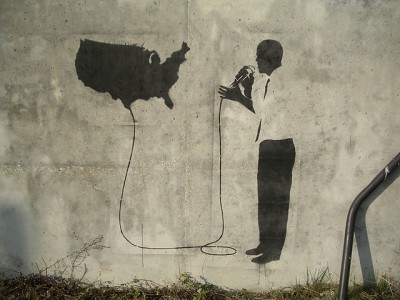
The 2016 presidential race has already started and it’s easy to get caught up in the horserace and forget about all of the technologies and tactics that campaigns employ to get their message out. The 2008 Obama campaign was the first to take full advantage of social media and eight years later these tactics seem to have become the new normal. It is now possible to deliver precisely tailored messages for key demographics and even individuals. American presidential campaigns have never been models of democracy but with the help of private databases and corporate collusion, the 2016 presidential race is shaping up to be a very murky process.
What deserves our immediate attention is what Zeynep Tufekci, in a 2014 First Monday article, calls computational politics. “Internet’s propensity for citizen empowerment is neither unidirectional, nor straightforward.” Warns Tufekci, “The same digital technologies have also given rise to a data–analytic environment that favors the powerful, data–rich incumbents, and the technologically adept, especially in the context of political campaigns.” The use of big data “for conducting outreach, persuasion and mobilization in the service of electing, furthering or opposing a candidate, a policy or legislation” is computational politics.
In the past, campaigns relied on general relationships between demographics and voter behavior and reception to key messaging tactics. Today, instead of focusing in on “white males over the age of 65” a campaign message can be tailored specifically to an individual based on a natural language analysis of Facebook status updates, purchasing history, and other kinds of data. This means that not only are campaigns going to get much more personally persuasive, they are, somewhat paradoxically, going to get much more fractured. The same candidate can present themselves as a job creating capitalist to your slightly left of center dad while touting tough climate change legislation to the college student that has Greenpeace “liked’ on Facebook.
One might be tempted to see this as a more powerful version of what Herman and Chomsky called their “Propaganda Model” in their famous book Manufacturing Consent. Herman and Chomsky argue that instead of being skeptical and adversarial opponents to powerful interests, the media is actually complicit in framing and shaping the news in such a way that it legitimizes the state’s use of violence. “It is much more difficult” they write, “to see a propaganda system at work where the media are private and formal censorship is absent.
While this still holds true, social media doesn’t just broadcast information from a few people to a larger audience, it also shapes and mediates our conversations between each other. Tufecki cites studies that concluded Facebook could increase –to a statistically significant degree–voter turnout by showing users a list of their friends that had voted followed by a “go vote!” message. It doesn’t take much imagination to think of a scenario where a similar method is put up for sale as a way to selectively get out the vote for a particular candidate or party.
Even when the candidates don’t have algorithms to hide behind, their teams are adept at controlling the conversation and avoiding important topics. In the debates of the 2012 campaign there was virtually no discussion of drone warfare until the last debate where Romney and Obama agreed that drones were totally awesome. There was also absolutely no discussion of climate change, even though it has been a major debate topic for decades and the problem has only gotten worse. What sorts of topics can we expect to not hear about this campaign season? Will the candidates take strong stands on killer police, NSA spying, or escalating wars in the Middle East? If there isn’t loud and long debates on these subjects we should assume they all agree that these are good things worth keeping around. Or, at the very least, campaign coordinators have all agreed that the politically viable opinions that secure winning percentages of the population have no bearing on sensible and permanent solutions.
Finally, we should be ready to hear a deafening silence when it comes to who actually gets to do the voting once all the campaigning is over. Who is allowed to do the voting gets smaller and smaller every year, thanks to so-called “voter fraud prevention” laws that take wild and wide swipes at voter rolls; knocking out people who should be able to vote. In October of last year, just before the midterm elections, Al-Jazeera reported on massive voter suppression efforts “that threatens a massive purge of voters from the rolls. Millions, especially black, Hispanic and Asian-American voters, are at risk.”
Much of voter suppression, according to the Al-Jazeera report, is accomplished through the Crosscheck Program. Crosscheck is a database that purports to help election officials see if people have voted more than once by comparing names of registered voters in different districts and states. The system spits out so many false positives that its continued use is an implicit admission of guilt. Moreover, it seems the program’s “lists are heavily weighted with names such as Jackson, Garcia, Patel and Kim — ones common among minorities, who vote overwhelmingly Democratic.”
Regardless of your feelings about whether or not –either through design or consequence of external factors– presidential campaigns are effective political change agents, it is safe to say that many of the databases that are coming online today are not in service of the greater good. They reify power differentials that hide us from candidates’ true intentions and (even worse) our own opinions about those candidates. By taking conversations that should be had in groups and in public, and personalizing them to the point of individual private conversation, we lose a lot of the advantages that come with outnumbering our elected officials. We can’t compare notes or even ask the same questions. We aren’t only battling misinformation, we have to do the hard work of fighting to know what we do not know about our candidates and the issues.
